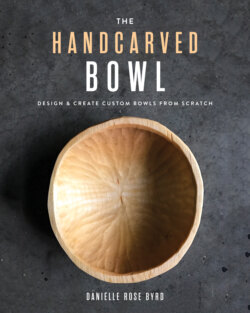Читать книгу The Handcarved Bowl - Danielle Rose Byrd - Страница 58
На сайте Литреса книга снята с продажи.
Оглавление58
T H E H A N D C A R V E D B O W L
Chapter 3 | S H A R P E N I N G
called a slipstrop. These slipstrops
can either be bought, such as the
Flexcut version (N), or made, and
loaded with compound as another
alternative. The tools themselves,
if sharp enough, can be used to
create the shape needed. (O)
These are especially useful for
small or oddly shaped profiles.
If you are custom making them,
clearly label each profile so it can
be easily identified when needed.
How Often Should You Strop?
I strop my edges every so often
while carving to keep them as
sharp as possible. This could be
anywhere from a few hours to every
30 minutes. This depends on the
material, type of cuts you are tak-
ing, and from what steel your tools
are made. A tool will wear down
more quickly with denser woods,
and end-grain cuts will require a
consistently keen edge to produce
smooth cuts. Inferior steel won’t be
able to hold an edge as long and
will need to be touched up more
frequently, perhaps with something
even more aggressive than a strop,
which is why it’s always wise to buy
the best tools you can afford.
It’s important to use all of this
knowledge and read how the tool
is working to judge when strop-
ping, or even when re-sharpening,
is necessary. When you begin to
achieve super sharp results, it be-
comes much easier to distinguish
when the tool begins to underper-
form. As soon as you notice this,
strop. Just a few strokes on the
inside and outside/both sides of
the edge will do.
This kind of upkeep only works
if you are addressing a very lightly
dull edge. If the tool is allowed
to fully dull, it will need to be
addressed with more aggressive
abrasives to re-establish the burr,
remove it, and polish the edge all
over again, which shows why keep-
ing up with your tool edges saves
time and money. When stropping
no longer brings the tool back
to sharp is when it should be ad-
dressed with the other abrasives.
O
N
